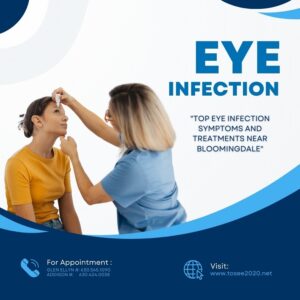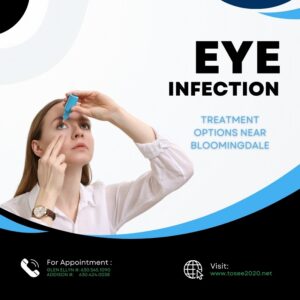Symptoms And Treatments Of Eye Infections Near Bloomingdale.
Eye infections are common and can affect anyone, leading to discomfort, impaired vision, and, in some cases, further health complications if untreated. Knowing the signs of an eye infection and when to seek treatment is crucial, especially If you live near Bloomingdale, you can access several specialized care options to find the best treatments for eye infections near Bloomingdale.This guide will help you identify the symptoms of common eye infections and outline effective treatment options.

Signs of Eye Infections:
Eye infections can be caused by various pathogens like bacteria, viruses, or fungi, each leading to specific symptoms. Here are the top signs to watch out for:
Redness:
Redness in the eyes is often the first visible sign of an infection. This may indicate an underlying condition like conjunctivitis (pink eye), keratitis, or uveitis. If the redness persists or worsens, it’s essential to seek treatment to prevent the infection from spreading.
Eye Discharge:
Unusual discharge from the eyes is another common symptom. Bacterial infections typically cause yellow or green discharge, which may crust over the eyelashes, particularly after sleeping. Viral infections often produce clear, watery discharge, but in either case, it’s a clear sign to visit a healthcare professional.
Itching and Irritation:
Intense itching or a feeling of grit in the eye can signify an infection, often associated with allergic conjunctivitis. However, if the itchiness persists and is accompanied by other symptoms like redness or swelling, it could be an indicator of a bacterial or viral infection.
Swelling Around the Eyes:
Swelling of the eyelids or surrounding area is a common sign of more serious eye infections. This symptom often points to blepharitis or cellulitis, which may require immediate medical intervention to prevent complications.
Blurry Vision and Light Sensitivity:
Vision changes like blurriness or heightened sensitivity to light (photophobia) often suggest an infection affecting the deeper layers of the eye, such as keratitis or iritis. Blurry vision is particularly concerning as it can worsen quickly without treatment.
Pain or Discomfort:
Pain is often a sign of a more severe infection that may have affected the cornea. If you experience persistent pain or discomfort, especially if coupled with any of the symptoms above, it’s essential to seek immediate treatment.
Treatment Options Near Bloomingdale:
If you suspect you have an eye infection, consulting with an eye specialist near Bloomingdale is recommended for prompt diagnosis and treatment. Here are some common treatment options available:
Antibiotic Eye Drops and Ointments:
For bacterial infections like conjunctivitis or styes, an ophthalmologist may prescribe antibiotic eye drops or ointments. These medications help eliminate bacteria and prevent further infection. Be sure to complete the full course, even if symptoms improve.
Antiviral Medications:
Viral infections, especially those caused by the herpes simplex virus, require antiviral eye drops or oral medication. While viral infections usually resolve on their own, antiviral treatments can help reduce the duration and severity of symptoms.
Warm Compresses and Artificial Tears:
For less severe infections or mild discomfort, your doctor may recommend warm compresses to alleviate symptoms. Artificial tears can help keep the eyes moist and wash away irritants. However, it’s important to consult a healthcare provider before starting any at-home remedies.

Steroid Drops for Inflammation:
In cases of severe inflammation caused by c
onditions like keratitis or uveitis, your eye doctor may prescribe steroid eye drops. These help to reduce inflammation, alleviate pa
in, and protect the eye from further damage.
Allergy Management for Chronic Conditions:
For recurrent infections related to a
llergies, such as allergic conjunctivitis, allergy management is key. Your eye doctor may recommend allergy medications, along with advice on avoiding allergens, to help prevent future infections.
When to Seek Immediate Care?
If you experience any severe symptoms, including intense pain, sudden vision changes, or symptoms that persist despite treatment, visit a healthcare provider near Bloomingdale immediately. Early treatment can prevent infections from worsening and protect your eye health in the long run.
In summary, understanding the symptoms of eye infections and knowing when to seek help are essential for maintaining healthy vision. With the right treatment options readily available in Bloomingdale, you can effectively manage and treat eye infections before they impact your quality of life.
